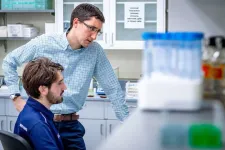Outsmarting chemo-resistant ovarian cancer
New approach with nanoparticle starves cells of cholesterol and reduces tumor growth by 50%
2024-02-21
(Press-News.org)
· Most women with ovarian cancer develop resistance to chemotherapy
· Nanoparticle fools cancer cells and prevents cholesterol from entering
· More than 18,000 women a year die from ovarian cancer
CHICAGO --- Women diagnosed with ovarian cancer may initially respond well to chemotherapy, but the majority of them will develop resistance to treatment and die from the disease.
Now Northwestern Medicine scientists have discovered the Achilles heel of chemotherapy-resistant ovarian cancer — its hunger for cholesterol — and how to sneakily use that to destroy it.
In a new study, scientists first showed that chemotherapy-resistant ovarian cancer cells and tumors are rich in cholesterol due to an increased uptake of it. They then deployed a synthetic nanoparticle that appeared to the cancer cells as a natural one rich in cholesterol. But when the cancer cells bound the fake particle, the mimic actually blocked cholesterol uptake. Additionally, the scientists showed that reducing cholesterol tricked the cancer cells down a cell death pathway. Treatment with the nanoparticle reduced ovarian tumor growth by more than 50% in human cells and animal models.
“This is a new weapon to destroy resistant ovarian cancer,” said co-corresponding author C. Shad Thaxton, associate professor of urology at Northwestern University Feinberg School of Medicine.
“More than 18,000 women die of ovarian cancer every year,” said co-corresponding author Dr. Daniela Matei, a professor of medicine at Northwestern University Feinberg School of Medicine and a Northwestern Medicine oncologist. “Finding new ways to attack resistant cancer cells is very important.”
Matei and Thaxton show the way the cells die after treatment with these nanoparticles is a form of cell death executed through oxidation of lipids in the cell membrane.
“These cancer cells are resistant to the typical form of death — apoptosis — which is why chemo can’t kill them,” Matei said.
The ovarian cancer findings build on Thaxton and Dr. Leo Gordon’s earlier pre-clinical research using nanoparticles to treat lymphoma.
This new study, published recently in Advanced Science, showed the approach also works in ovarian cancer cells.
Matei and Thaxton tested the nanoparticles in ovarian cancer cells and in animals with xenografts of chemotherapy-resistant ovarian cancer. The next step in the research is to test a combination of the particles with traditional chemotherapy and study the effects of the nanoparticles on immune cells that fight against cancer.
Matei also is the Diana Princess of Wales Professor of Cancer Research. She and Thaxton are both members of the Robert H. Lurie Comprehensive Cancer Center of Northwestern University.
Other Northwestern authors are Yinu Wang; Andrea E. Calvert; Horacio Cardenas; Jonathon S. Rink; Dominik Nahotko; Wenan Qiang; C. Estelle Ndukwe; Fukai Chen; Russell Keathley; Yaqi Zhang; and Ji-Xin Cheng.
The title of the article is “Nanoparticle Targeting in Chemo-Resistant Ovarian Cancer Reveals Dual Axis of Therapeutic Vulnerability Involving Cholesterol Uptake and Cell Redox Balance.”
The research was funded by a grant from the U.S. Department of Defense Office of the Assistant Secretary of Defense for Health Affairs, through the Ovarian Cancer Research Program.
****Thaxton and Andrea Calvert have a relationship with Zylem Biosciences, Inc., which is a start-up biotechnology company with license to the drug technology from Northwestern University.
END
ELSE PRESS RELEASES FROM THIS DATE:
2024-02-21
“There’s a narrative out there about climate change that says there are winners and losers. Even if most of the planet might lose from the changing climate, certain industries and countries stand to benefit. And Russia is usually at the tip of people’s tongues, with Russian officials even making the claim that Russia is a potential winner.”
This portrayal, described by Debra Javeline, associate professor of political science at the University of Notre Dame and lead author on the recently published study “Russia in a changing climate,” was debated ...
2024-02-21
University of North Carolina at Chapel Hill researchers have developed a new drug delivery platform that harnesses helical amyloid fibers designed to untwist and release drugs in response to body temperatures.
A new research paper published on Jan. 26 in Nature Communications reveals groundbreaking structural details into how diseases form much like Alzheimer’s disease. With this knowledge, the group may have uncovered a unique mechanism to reverse both the deposits and their impact on those suffering from these conditions.
UNC-Chapel Hill researcher Ronit Freeman ...
2024-02-21
New York, NY (February 21, 2024) – A novel treatment for polycythemia vera, a potentially fatal blood cancer, demonstrated the ability to control overproduction of red blood cells, the hallmark of this malignancy and many of its debilitating symptoms in a multi-center clinical trial led by the Icahn School of Medicine at Mount Sinai.
In the phase 2 study, the drug rusfertide limited excess production of red blood cells, the main manifestation of polycythemia vera, over the 28-week course of ...
2024-02-21
Body composition — often expressed as the amount of fat in relation to muscle — is one of the standard predictors of cardiac health. Now, new research from the University of California San Diego indicates more muscle doesn’t automatically mean lower risk of heart trouble.
The study, published in the Journal of the American Heart Association, found all muscle isn’t the same. Britta Larsen, PhD, says men with a higher area of abdominal muscle have a greater risk of cardiac trouble. It’s a completely different ...
2024-02-21
EMBARGOED FOR RELEASE UNTIL 4 P.M. ET, WEDNESDAY, FEBRUARY 21, 2024
MINNEAPOLIS – People with higher exposure to traffic-related air pollution were more likely to have high amounts of amyloid plaques in their brains associated with Alzheimer’s disease after death, according to a study published in the February 21, 2024, online issue of Neurology®, the medical journal of the American Academy of Neurology. Researchers looked at fine particulate matter, PM2.5, which consists of pollutant particles of less than 2.5 microns in diameter suspended in air.
The study does not prove that air pollution causes more amyloid plaques in the brain. It only ...
2024-02-21
More than 40% of Americans know someone who has died of a drug overdose and about one-third of those individuals say their lives were disrupted by the death, according to a new RAND study.
Analyzing a national representative survey of American adults, researchers found that the lifetime exposure to an overdose death is more common among women than men, married participants than unmarried participants, U.S.-born participants than immigrants, and those who live in urban settings as compared to those in rural settings.
Rates of exposure were significantly higher in New England (Connecticut, Maine, Massachusetts, ...
2024-02-21
The University of Notre Dame has received a Collaborative Pairs Pilot Project Award from the Chan Zuckerberg Initiative to study genes that affect neurodegenerative diseases, such as Alzheimer’s disease.
This is Notre Dame’s first award from the Chan Zuckerberg Initiative.
The award will fund a partnership between Cody Smith, the Elizabeth and Michael Gallagher Associate Professor of Biological Sciences at Notre Dame and a 2017 Alfred P. Sloan Fellow, and Beth Stevens, member of the Broad Institute of MIT and Harvard and a 2015 MacArthur Fellow. With their combined expertise in neurological development, they will explore how gene expression and function changes with ...
2024-02-21
Following the huge success of the previous edition, the 15th edition of the Skin Ageing & Challenges International Conference is set to take place on November 7-8, 2024, at Corinthia Palace in Malta. The conference will provide attendees with a comprehensive overview of the current landscape and future prospects in skin aging research.
Professor Jean Krutmann, conference president, is just as excited as we are: “Skin aging is complex, but by working together across different fields, we’re making incredible strides. This conference is where all that collaboration shines, helping us find new ways to keep our skin healthy and vibrant.”
Skin ...
2024-02-21
BERKS, Pa. — The supermassive black hole in the center of the Milky Way is spinning so quickly it is warping the spacetime surrounding it into a shape that can look like a football, according to a new study using data from NASA’s Chandra X-ray Observatory and the U.S. National Science Foundation’s Karl G. Jansky Very Large Array (VLA). That football shape suggests the black hole is spinning at a substantial speed, which researchers estimated to be about 60% of its potential limit.
The work, led by Penn State Berks Professor of Physics Ruth Daly, was published in the Monthly Notices of the Royal Astronomical Society.
Astronomers call this giant ...
2024-02-21
KANSAS CITY, MO—February 21, 2024—The Chan Zuckerberg Initiative (CZI) has announced the awardees of their second cycle of Collaborative Pairs Pilot Project Awards, part of the CZI Neurodegeneration Challenge Network (NDCN).
Scientific Director Kausik Si, Ph.D., from the Stowers Institute for Medical Research will receive an award for the project titled, “Tuning memory by altering amyloids,” which will be conducted alongside Investigator Lukasz Joachimiak, Ph.D., from the University of Texas Southwestern.
The Collaborative Pairs Pilot Project Awards were launched in 2018 to investigate unsolved mysteries ...
LAST 30 PRESS RELEASES:
[Press-News.org] Outsmarting chemo-resistant ovarian cancer
New approach with nanoparticle starves cells of cholesterol and reduces tumor growth by 50%





